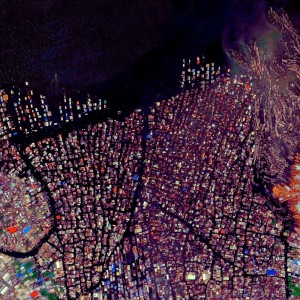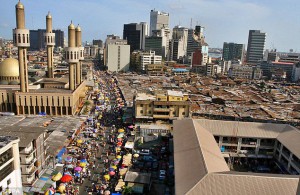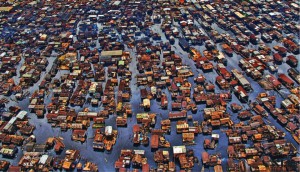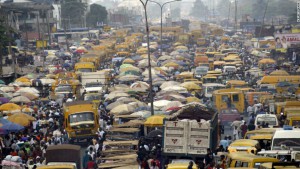Just in case we’ve forgotten, Lagos is huge, geographically, population-wise, and also in terms of cultural influence in Africa, and increasingly, the rest of the world.
Never before has Nigeria’s art and music scene had such a broad global audience. Novels by new Nigerian authors like Chimamanda Ngozi Adichie (“Americanah“, “Half of a Yellow Sun“) and Teju Cole (“Every Day is For The Thief“, “Open City” are winning prizes and admirers in the US for their honest, direct and hilarious depictions of Nigerian life, both past history and the jarring, jerry-mandered 21st-century transcontinental life many Nigerians are making the big leap to experience.
Both young Nigerians of means traveling legally for pleasure and higher education at many of the most renowned universities in the US and UK, and those in lower economic circumstances who, (even if it means risking using false documents to travel into the West illegally, or breaking some rules) are pursuing their dream of coming back home to success by traveling to Europe or America in ever greater numbers.
Nigerians are trying to make a better life for themselves and to eventually return to in Nigeria. In the 21st century, connecting to the rest of the world has become necessary for Nigerians, and for many, their reality is spread between Lagos and London, perpetually on the move between the two.
Both of these trajectories are reflected in Adichie and Cole’s books, and in the styles of music filling Nigerian radio airwaves and the vast musical archive that is YouTube, where young Nigerians are most excited about artists like WizKid, a talented DJ and singer who has been performing since the age of 11, and has captured the attention of Lagos’s listeners, along with recent hit-maker Iyanya (who, uniquely, sings in a combination of Nigerian Pidgin and the Efik language), well known for his fast-paced afropop with azonto beat hit, “Kukere“.
I recently visited and lived in Lagos for a short temporary work contract, before traveling onwards on-board a Soviet Antonov propeller plane to the Islamic emirate city-state of Kano, continuing by four-wheel-drive in Nigeria’s Hausa and Fulani speaking north through the other former Islamic emirates Kaduna and Zaria and crossing the border into Niger, a very different country than Nigeria in many ways.
There are very few ways to describe the unique chaos that is the hustle-and-bustle and daily comings-and-goings that are happening in the megacity of Lagos, a city of extreme contrasts; the newer Western mixing with the traditional African. A great way to see a demonstration of this and to capture some of what I saw in my experience with Lagos is to see the Lagos that WizKid captures in his music video “OJUELEGBA”, which centers on themes of transport in Lagos and references the “Ifa” faith, an indigenous religion that is very similar to the folk traditional religions which exist in the Caribbean like vodou and obeah.
The traffic scenes in the video are a very serious part of life in Lagos, a city never designed for the sheer amount of cars now on its roads. The iconic yellow VW vans, which Lagosians call “danfo”, have been modified to take as many passengers as possible and is now as iconic and ubiquitous as the NYC yellow Ford Crown Victoria taxicab.
Lagos boasts some of the worst traffic jams of any country in the road; a myriad of unique quirks like gangs of street youth called “area boys” digging holes in the road and demanding money to fill the holes back up and let cars through to roving vendors selling wares of literally every kind. Businessmen, students, politicians, day labourers; all become equal as one mass as passengers trapped in what is called a “go-slow”, a traffic back up for which Lagos is famous.
Added to the chaos is the ever-present dance of the corrupt policemen and many regulatory agencies, who try to extort the “danfo” drivers and passengers and the melodic calls of the “danfo conductor”, the danfo driver’s assistant who attract potential customers with their clever rhymes and attention-getting slogans, and act as watchmen against the corrupt law enforcement bureaucracy.
As Lagos continues to grow, undoubtedly more and more of the world will become familiar with Nigeria’s unique and special offerings in pop culture, be it through books, films, music or more. Nigerian media captures the relentless changes in society, and more and more of the world is listening and watching.



